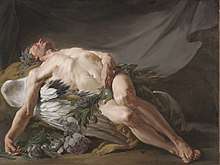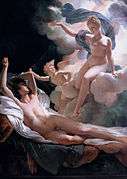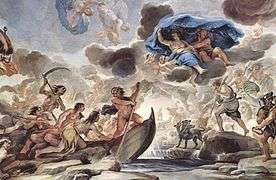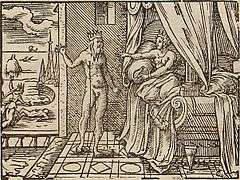Morpheus

Morpheus (/ˈmɔːrfiəs/ or /ˈmɔːrfjuːs/) is a Greek god of dreams who appears in Ovid's Metamorphoses.[1]
Mythology
The Roman poet Ovid states in his Metamorphoses that Morpheus is a son of Hypnos and reports that he had a thousand siblings, with Morpheus, Phobetor and Phantasos being merely the most prominent among them.[2] Robert Burton, in his 1621 Anatomy of Melancholy, refers to Classical depictions of Morpheus, saying "Philostaratus paints [Morpheus] in a white and black coat, with a horn and ivory box full of dreams, of the same colours, to signify good and bad".[3] Starting in the medieval period, the name Morpheus began to stand generally for the god of dreams or of sleep.[4] In Carl Michael Bellman's Fredman's Epistle No. 72, "Glimmande nymf", Morpheus is invoked as the god of sleep.[5]
Gallery
 Aurora wakes Morpheus by Bartolomeo Altomonte (1769)
Aurora wakes Morpheus by Bartolomeo Altomonte (1769) Morpheus and Iris, by Pierre-Narcisse Guérin, 1811 Hermitage Museum
Morpheus and Iris, by Pierre-Narcisse Guérin, 1811 Hermitage Museum Morpheus awakening as Iris draws near by René-Antoine Houasse (1690)
Morpheus awakening as Iris draws near by René-Antoine Houasse (1690) Fresco in the gallery of the Palazzo Medici-Riccardi in Florence: Charon's boat, the sleep of Night and Morpheus by Luca Giordano (1684–1686)
Fresco in the gallery of the Palazzo Medici-Riccardi in Florence: Charon's boat, the sleep of Night and Morpheus by Luca Giordano (1684–1686)- Evening or Morpheus by Charles Le Brun
 Morpheus appears to Alcyone. Engraving by Virgil Solis for Ovid's Metamorphoses Book XI, 650–749.
Morpheus appears to Alcyone. Engraving by Virgil Solis for Ovid's Metamorphoses Book XI, 650–749. Morpheus appears to Alcyone. Engraving (or etching more likely) by Bauer for Ovid's Metamorphoses Book XI, 633–676.
Morpheus appears to Alcyone. Engraving (or etching more likely) by Bauer for Ovid's Metamorphoses Book XI, 633–676.
Derivation
- Friedrich Sertürner derived the name of the opiate drug morphine from the name of Morpheus.
See also
References
- ↑ Ovid, Metamorphoses 11.633 ff.
- ↑ Ovid (1836) p. 54
- ↑ Burton (2001) (Pr. 2, Sec. 2)
- ↑ Kearns (1996)
- ↑ Britten Austin, Paul. The Life and Songs of Carl Michael Bellman: Genius of the Swedish Rococo. Allhem, Malmö American-Scandinavian Foundation, New York, 1967, pages 87–88. ISBN 978-3-932759-00-0
Bibliography
- Burton, Robert. (2001), William H. Gass., eds., The Anatomy of Melancholy., New York, ISBN 9780940322660 .
- Griffin, A. H. F. (1997), A Commentary on Ovid, Metamorphoses XI, Hermathena, 162/163, Dublin, JSTOR 23041237 .
- Kearns, E. (1996), "Morpheus", in S. Hornblower & A. Spawforth (eds.), Oxford Classical Dictionary (3rd rev. ed.), Oxford, ISBN 9780198661726 .
- Ovid, Metamorphoses, Brookes More. Boston. Cornhill Publishing Co. 1922. Online version at the Perseus Digital Library.
External links
| Wikimedia Commons has media related to Morpheus. |